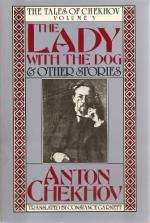|
This section contains 1,725 words (approx. 6 pages at 300 words per page) |

|
SOURCE: Baldeshweiler, Eileen. “The Lyric Short Story: The Sketch of a History.” Studies in Short Fiction 6, no. 4 (summer 1969): 443-53.
In the following excerpt, Baldeshweiler analyzes the so-called “lyrical” short story as represented by the short fiction of Turgenev and Chekhov.
When the history of the modern short story is written, it will have to take into account two related developments, tracing the course of the larger mass of narratives that, for purposes of clarification we could term “epical,” and the smaller group which, to accentuate differences, we might call “lyrical.” The larger group of narratives is marked by external action developed “syllogistically” through characters fabricated mainly to forward plot, culminating in a decisive ending that sometimes affords a universal insight, and expressed in the serviceably inconspicuous language of prose realism. The other segment of stories concentrates on internal changes, moods, and feelings, utilizing a variety of structural patterns...
|
This section contains 1,725 words (approx. 6 pages at 300 words per page) |

|


